SALT LAKE CITY — Even though Erin Mendenhall had what a political pundit called a “pretty definitive lead” of 17 percentage points Tuesday night, she didn’t declare victory in the race for Salt Lake City mayor — and her opponent Sen. Luz Escamilla didn’t concede.
That means Salt Lake City voters will likely have to wait until more results are posted Thursday for a final resolution to the race.
By the time final election night results were posted around 9:30 p.m., Mendenhall had 58.6% of the vote while Sen. Luz Escamilla had 41.4%. At the end of the night, 33,818 votes had been counted.
Results aren’t final — and they won’t be until the official canvass is complete in two weeks. Depending on how many last-minute ballots remain to be counted, the margin could narrow, but Escamilla has a daunting gap to close.
There’s no telling how many more ballots are left to be counted, but Salt Lake County Clerk Sherrie Swensen said it could be in the thousands.
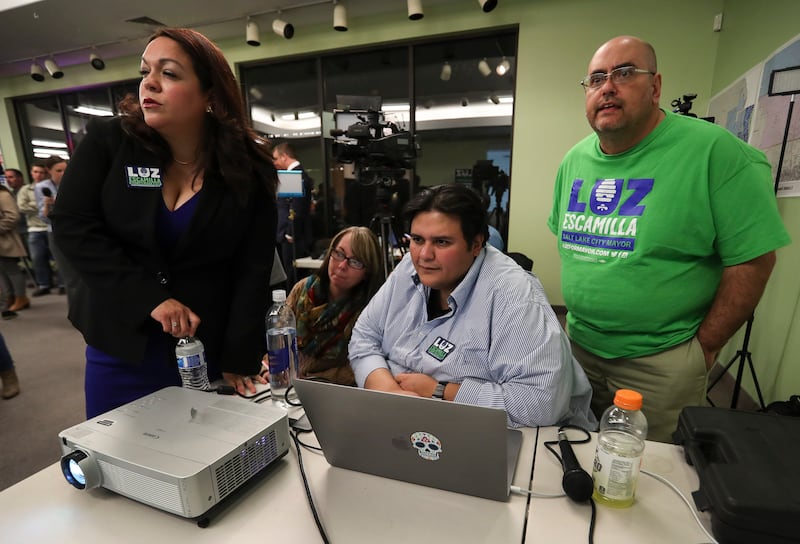
If Mendenhall’s lead holds, Salt Lake City will have elected a City Council member to the mayor’s seat for the first time in 30 years, the first since Palmer DePaulis was re-elected in 1987.
If Escamilla loses, Salt Lake City voters will have passed on their chance to elect the city’s first Latina mayor, and the first mayor to live on the city’s west side.
Mendenhall was met with chants of “Erin, Erin, Erin” as she took the stage to address the jam-packed crowd of supporters at her election night party at Publik Coffee Roasters.
“OK, it’s not over yet you guys,” Mendenhall said to laughs from her supporters, before launching into a passionate speech to thank her family and campaign staff, calling them the “best campaign team in the world.”
“Obviously this isn’t over yet, but the numbers are really exciting,” she said to loud cheers.
Mendenhall credited Escamilla on a “hard-fought campaign,” calling her opponent a “devoted public servant” and a “champion for our city,” crediting her for running a “great race.”
“For a community that has long felt underrepresented in this city, Sen. Escamilla’s candidacy was especially poignant and important,” Mendenhall said.
Mendenhall was met with more cheers when she highlighted that this year’s race made history as the first with two women running for mayor.
“What’s really remarkable is how truly unremarkable it was,” she quipped, noting that sex or gender wasn’t an issue in the race. “What warms my heart is all the girls who watched two women in Salt Lake City, our capital city, battle it for the hottest elected office in this city, and thought nothing of it. Girls, come and get this, it is yours.”
Mendenhall’s husband, former Salt Lake City Councilman Kyle LaMalfa, told the Deseret News he was “so proud of my incredible wife.”
Despite Mendenhall’s over 5,800 vote lead, Tim Chambless, a longtime political science professor at the University of Utah, didn’t expect an early resolution to the mayor’s race. He said Mendenhall has a “pretty definitive” lead, but he credited her for doing the “respectful thing” by waiting for more results to post Thursday.
“But certainly having a statistical advantage like this has to be, at this point, encouraging,” Chambless said.
Just before the first batch of results posted at 8 p.m., supporters at Mendenhall’s election night party mingled, ate and drank as they waited, chatting over the loud music. As time went on, the crowd and anticipation grew. Mendenhall remained absent from the crowd, watching the first batch of results post from another room.
When results posted, her supporters screamed and cheered as they crowded around a large screen showing the numbers. Mendenhall’s 13-year-old son, Cash, beamed as he snapped a picture of the screen before running off in excitement.
“It’s big,” he said of his mother’s early lead, covering his big smile with his hand.
About 20 minutes later, Mendenhall emerged from the back doors to more cheers and screams, joined by her husband and her 9-year-old son, Everett. She hugged supporters and mingled, but declined comment to the assembled media.
Her campaign manager, Ian Koski, said her early lead was “certainly wider than expected,” but he wasn’t going to declare victory. Later in the evening, he still declined to declare victory, noting an unknown number of outstanding ballots.
In a surprise appearance, Gov. Gary Herbert showed up to Mendenhall’s campaign party, applauding both Mendenhall and Escamilla, saying he had “great admiration for both of them” and “both had proven their mettle”
Herbert didn’t endorse any candidate during the race, but his leadership political action committee did contribute money to Mendenhall’s campaign.
“I’m a fan of Erin,” Herbert told reporters, saying he looked forward to a new day for relations between state and city leaders. He credited Mendenhall for being “the first one to call me” when negotiations broke down between him and Mayor Jackie Biskupski over the Utah Inland Port Authority.
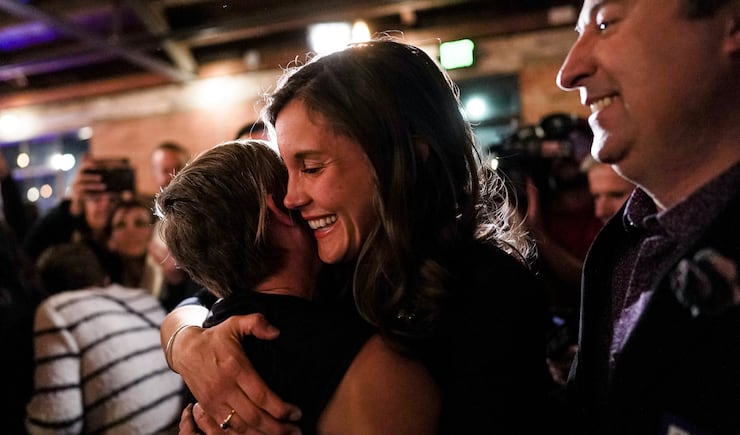
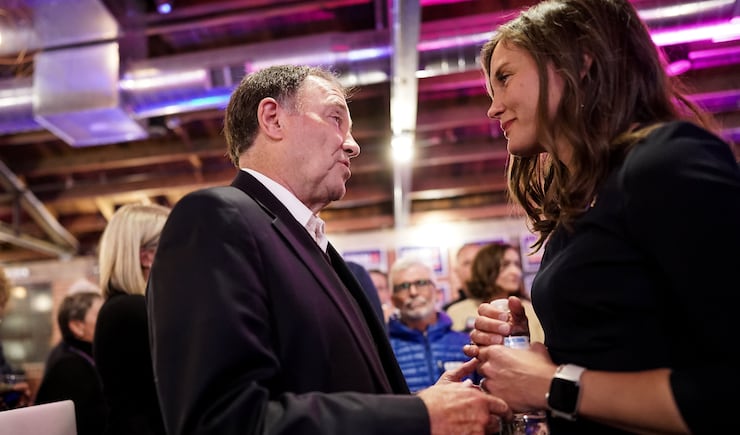
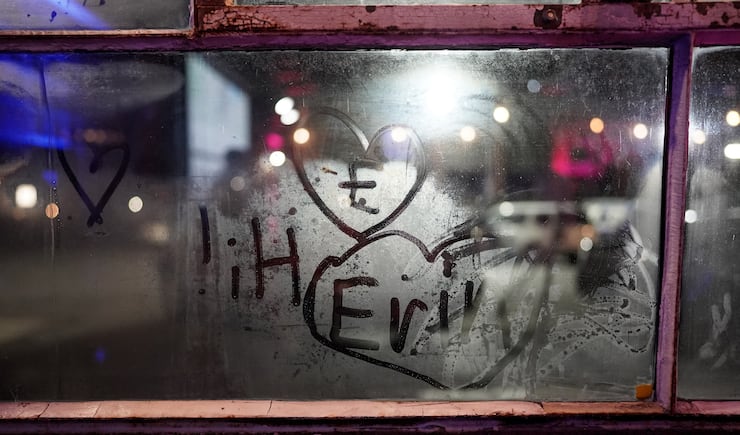
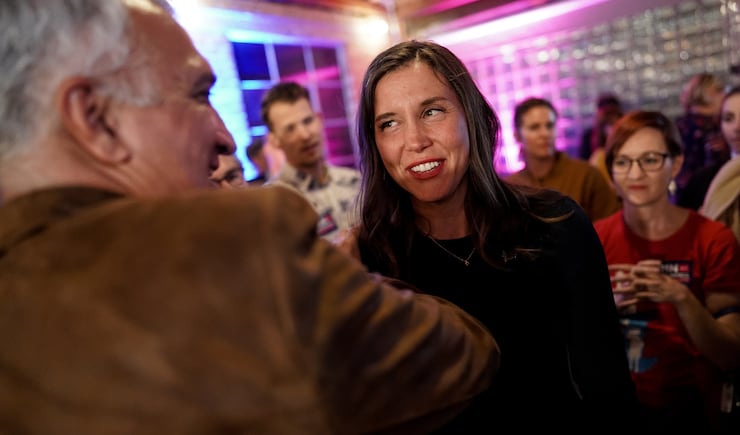
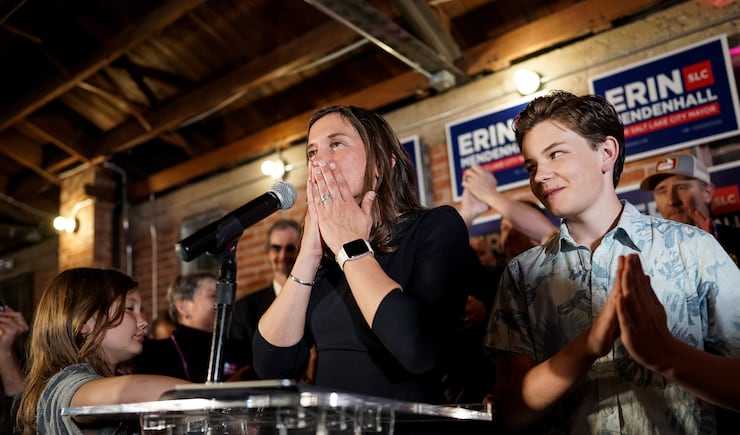
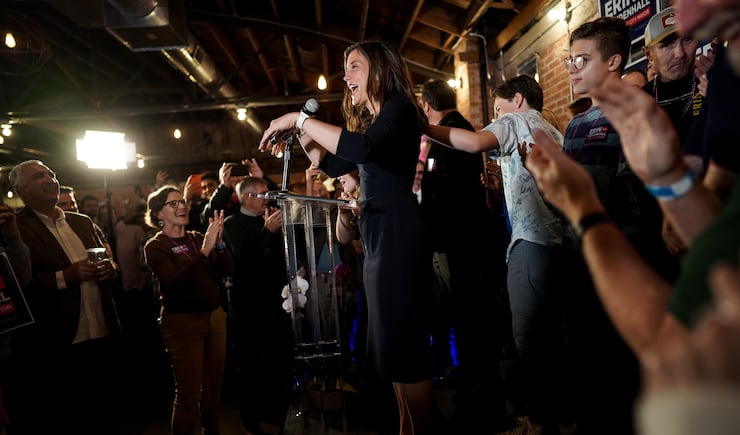
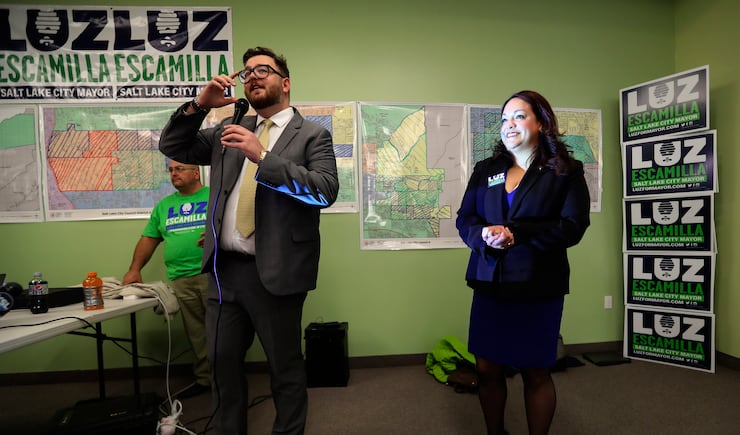

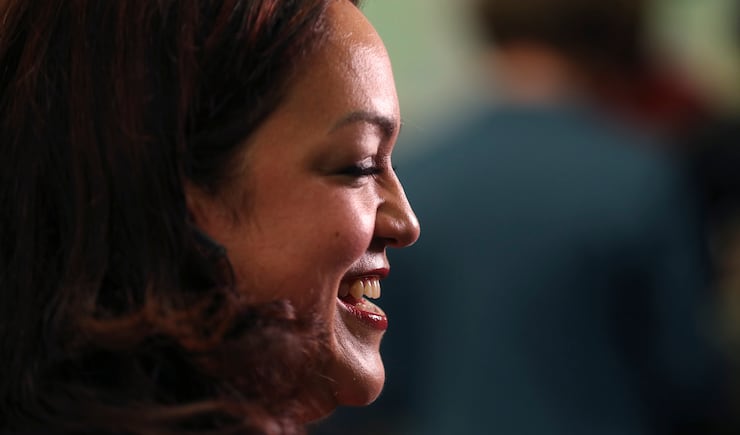
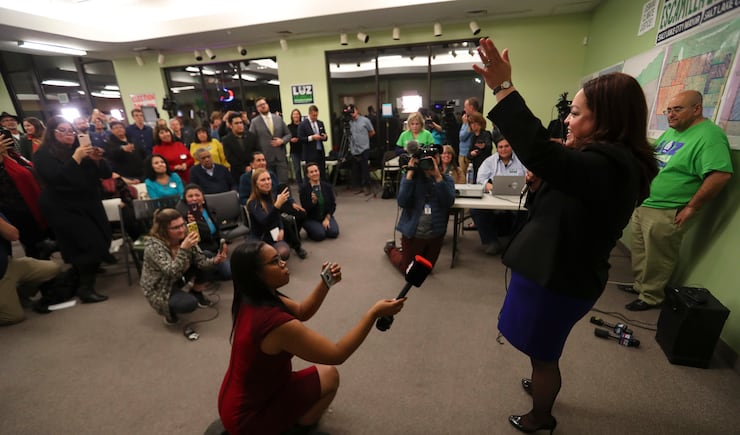
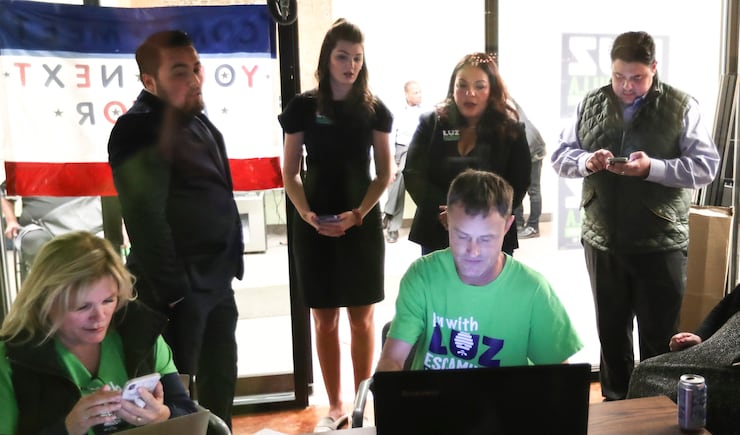
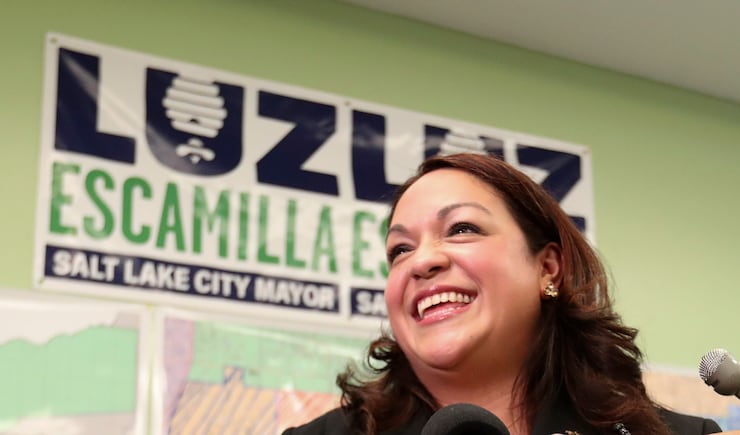
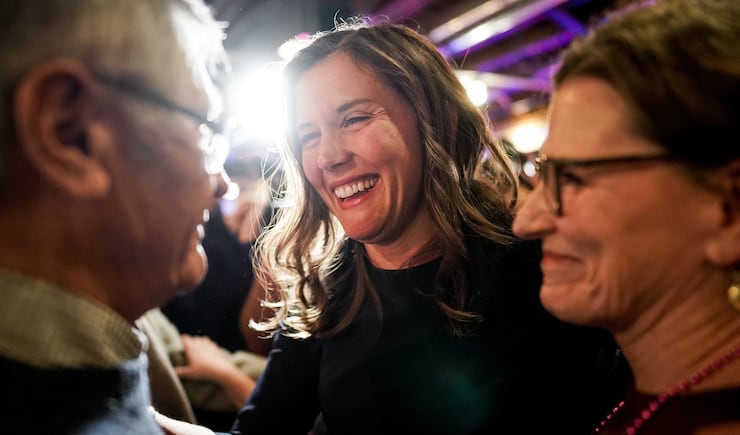
“That was leadership, it was bold leadership, it was something we needed to do,” he said. “I’m a big fan of Erin Mendenhall but I like Luz Escamilla also. I think Salt Lake City had a great choice, with either choice they’re not going to lose.”
Shortly before 10 p.m., Escamilla told a crowd of supporters she remained hopeful but was waiting for updated results on Thursday.
“We’re still here. There’s a lot of outstanding ballots and we’ve been here before,” she said, referring to primary election night in August, when she was in third place behind former state Sen. Jim Dabakis until additional ballots were counted. “We are very faithful and really feel strong about our last push.”
A man shouted, “We love you, Luz,” and the crowd burst into applause and cheers.
Escamilla said she was knocking on doors in the Glendale neighborhood until about 6:30 p.m. and told reporters shortly before the first results appeared that she felt good about the race but wasn’t expecting a winner to be declared Tuesday.
”It’s going to be a long week,” the Senate minority whip said.
Earlier in the evening at Escamilla’s storefront headquarters on 900 South near State Street, about two dozen volunteers were still making calls, pausing only to clap and whoop at the sound of a bell being rung, signaling an undecided voter had been convinced to back her.
“It comes down to getting the vote out, where are the undecideds going to go,” Chambless, said as he looked over the sparsely decorated room. He said because voters had two strong candidates to choose from, some were having difficulty deciding.
Escamilla told reporters the margin was “not what we wanted or expected” but the campaign is counting on late voters to make up the difference, especially from the west side of the city where she lives even though they typically do not turn out in the same numbers as voters from the more affluent east side.
“I have a lot of hope and trust that those communities will also see an opportunity to change the representation at City Hall,” she said.
Her field director, Richard Jaramillo, said closing the gap was “definitely doable.” He said the campaign’s message was resonating with voters in the final days leading up to the election but “we’ll have to see.”
Polls placed Mendenhall as the front-runner in the race, though political pundits and candidates predicted a close race — one that likely wouldn’t be decided on election night. Pollsters have seen a path to victory for Escamilla, but predicted it would hinge on her campaign’s ability to rally enough supporters to drop off their ballots or go to the polls Tuesday.
In the final days leading up to Election Day, polls had also showed a large chunk of Salt Lake City voters still undecided.
In the August primary, final-day supporters pushed Escamilla over the finish line to advance to the November ballot. When a big batch of about 8,000 votes were posted two days after polls closed, only then did Escamilla surpass former state Sen. Jim Dabakis for the second-place slot to advance to the general election.
Tuesday night marked the end of a lengthy campaign season that began over a year ago when the first primary candidates jumped into the race to challenge Salt Lake City Mayor Jackie Biskupski, who later bowed out of the race, citing a complex and private family situation.
The August primary whittled down a crowded field of eight candidates to Escamilla and Mendenhall, marking a historic chapter for Salt Lake City: the first time two women would face off to become mayor of Utah’s capital.
The winner will become Salt Lake City’s third woman to be elected mayor. She’ll succeed Biskupski, who made history and national headlines when she narrowly unseated former Mayor Ralph Becker in 2015, becoming the city’s first openly gay mayor.
Escamilla’s campaign garnered national attention, including from the Los Angeles Times. An immigrant from Mexico, Escamilla, 41, has been heralded as a “powerhouse” symbolizing hope for minorities in Salt Lake City.
Mendenhall, 39, has served on the City Council for two terms, representing an east-side district. She got her start in politics through air quality advocacy, co-founding Breathe Utah and serving as chairwoman on the state’s Air Quality board. She has said her lifelong war with air pollution pushed her into public office, and air quality shapes the “lens” through which she sees every issue confronting Salt Lake City,
Political and economic pundits have stressed the importance of Salt Lake City’s mayor for not just the capital city, but also Utah as a whole and its place in national politics. While Salt Lake City’s mayor acts as one of the state’s few powerful Democratic voices and a symbol of Utah’s minority party, pundits say the mayor must also work alongside state leaders to represent a city that acts as a gateway to the rest of the state.
In a contest between a senator and a councilwoman, this year’s race has been characterized as a competition of state versus city experience. A key question posed to voters was to choose between a state lawmaker promising to bring state relationships off Capitol Hill or a city councilwoman with nuts-and-bolts knowledge of the city’s inner- workings.
The contest between Mendenhall and Escamilla has been fairly civil, after both candidates pledged to run “clean” campaigns — though when there was tension in debates, it was mostly over the controversial Utah Inland Port Authority, which surfaced as the biggest hot-button issue in this year’s race.
Overall, the tone of this year’s race has been largely positive with candidates intent on sticking to the issues. That’s in contrast with the much more contentious and at-times bitter 2015 race between Becker and Biskupski.
City Council races
Three Salt Lake City Council races are also up for election, with three incumbents running up against three challengers. Preliminary results from the 9:36 p.m. tally:
For District 2 — the southwest corner of the city made up of the Glendale and Poplar Grove neighborhoods — Councilman Andrew Johnston had 63% of votes, compared to 37% for challenger Moroni Benally.
For District 4 — the central city district made up of Downtown, Central City and East Central neighborhoods — Councilwoman Ana Valdemoros had 84% of votes compared to 16% for challenger Leo Rogers.
For District 6 — an east-side seat representing the Bonneville Hills, Sunnyside East, East Bench, Yalecrest and Wasatch Hollow neighborhoods — Councilman Charlie Luke was trailing challenger Dan Dugan by 5 votes, 3,408 to 3,413.
Correction: In an earlier version, a photo caption misidentified Erin Mendenhall as the daughter of former Salt Lake City Mayor Ted Wilson.
















